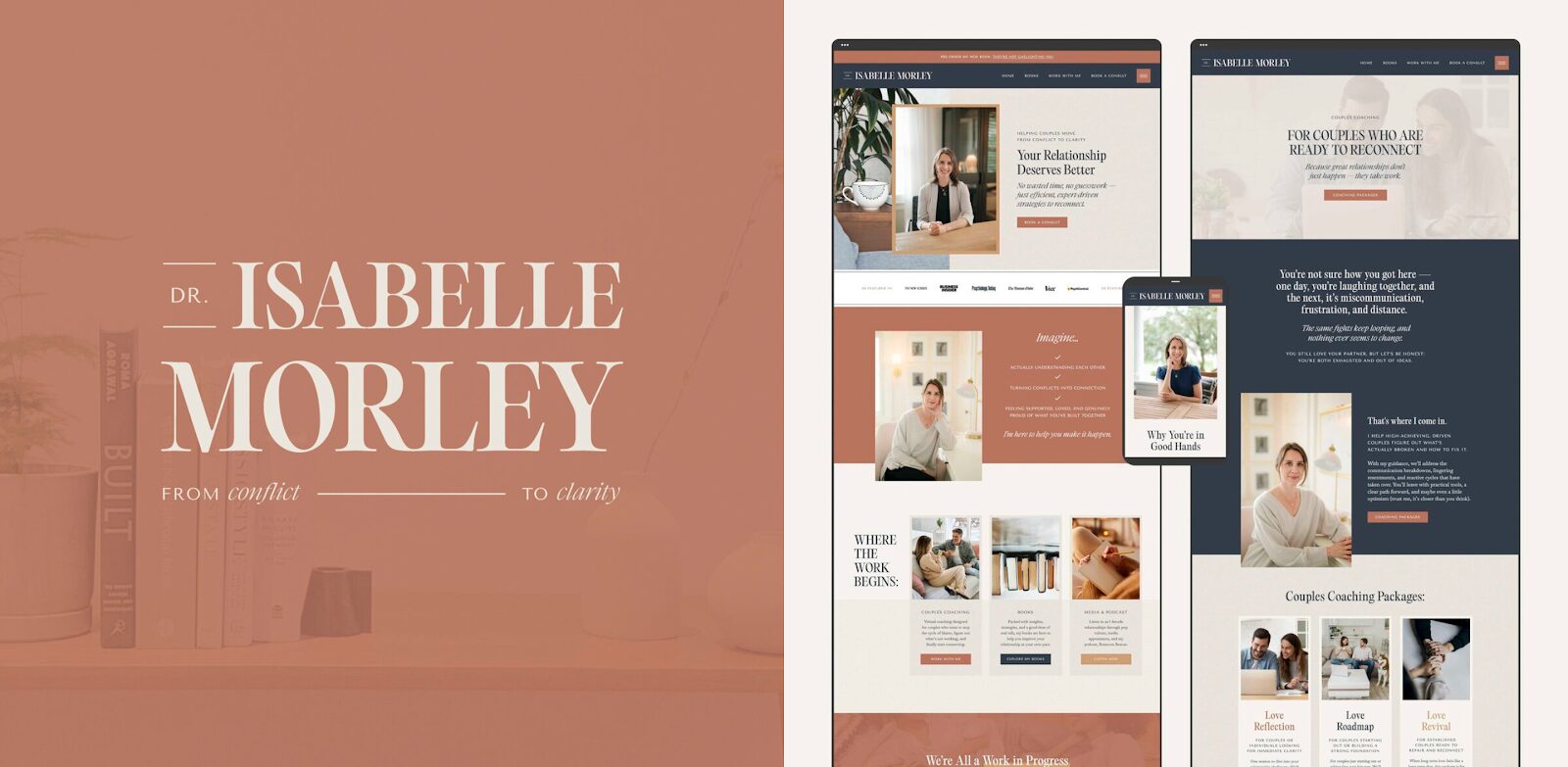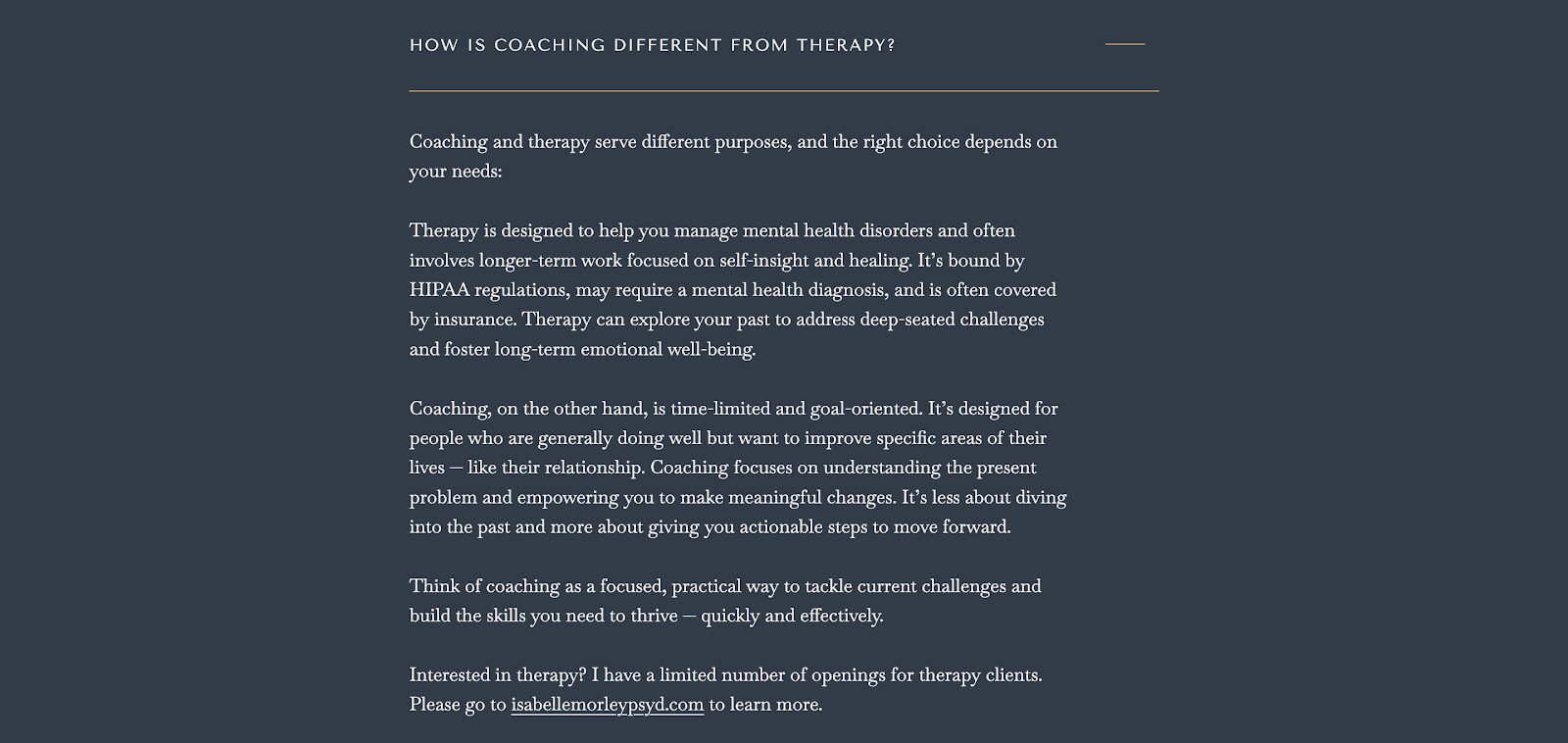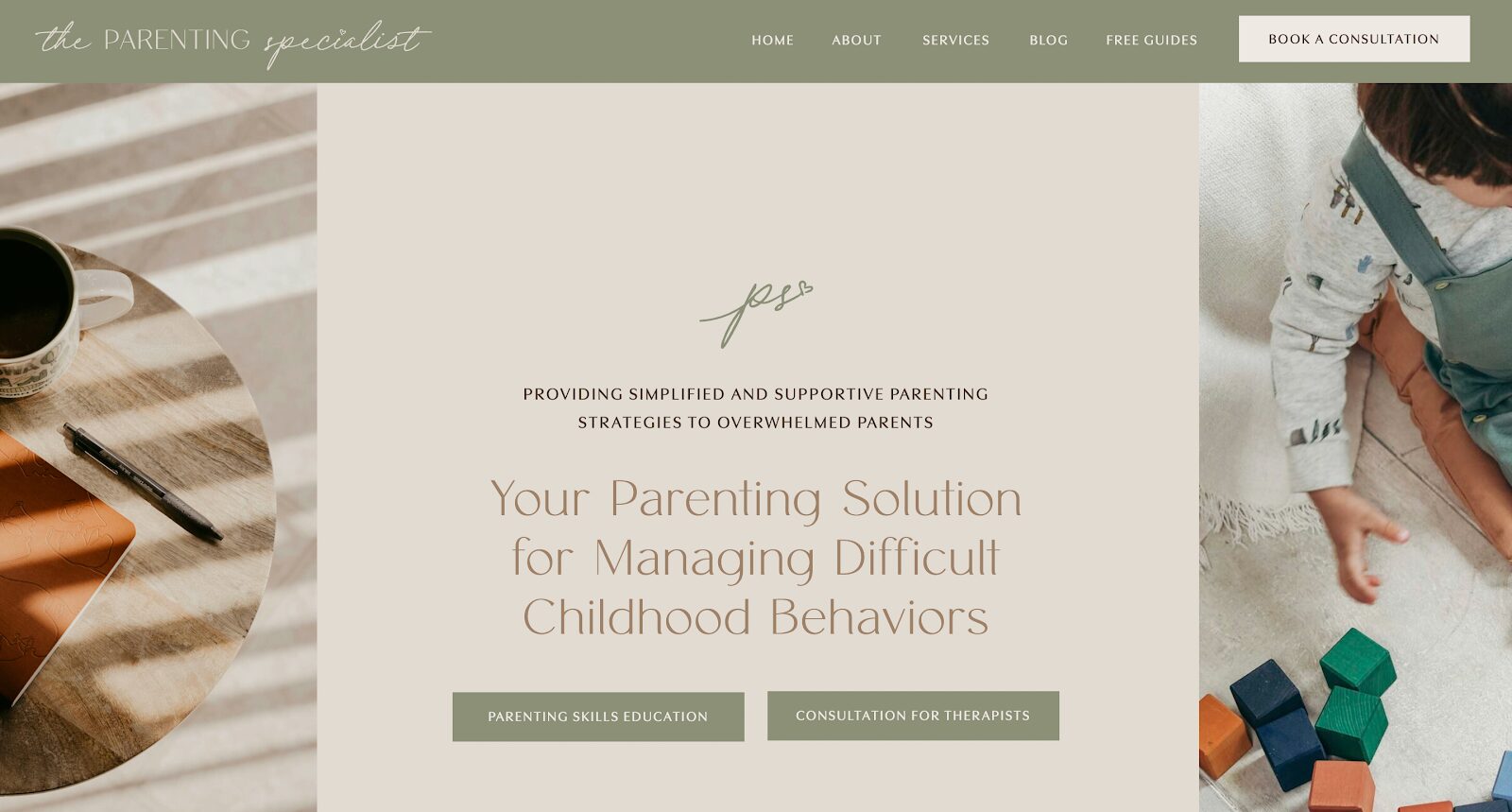Can a Therapist Be a Life Coach? Yes, Here’s How
June 20, 2025
Many therapists are drawn to life coaching because it offers more freedom, multiple revenue streams, and the ability to work with clients in new ways. If you’re wondering, “Can a therapist be a life coach?” the answer is yes.
However, your coaching business must be completely separate from your therapy practice. This comes with a few nuances you should know about.
Disclaimer: This blog post is for informational purposes only and should not be taken as legal advice. Always consult an attorney in your state for the most up-to-date legal advice and information regarding the specifics of your therapist practice.
Life Coach vs. Therapist: What’s the Difference?
The main distinction is that life coaches focus on helping clients achieve specific goals and navigate life transitions. Licensed therapists diagnose and treat mental health conditions.
What life coaches can do:
Life coaches work with clients on career transitions, relationship challenges, divorce recovery, business development, and personal growth goals. They provide accountability and help clients move forward in specific areas of their lives.
The coaching relationship is typically more collaborative and has fewer regulatory restrictions on how and where you can work with clients. For example, you can offer group coaching programs, create online courses, host retreats, or send text messages to your clients.
What only therapists can do:
As a therapist, you’re trained to diagnose and treat mental health disorders listed in the DSM. You can provide clinical interventions for conditions like depression, anxiety disorders, personality disorders, and trauma-related conditions.
This clinical expertise is something life coaches can’t and shouldn’t attempt to replicate.
Why offer life coaching services?
Coaching allows you to work with clients who don’t need clinical treatment but want support reaching their personal development goals. Many therapists find this work interesting and energizing.
Life coaching also gives you more flexibility. In addition to working with clients 1:1, you can also offer group programs, workshops, retreats, online courses, and pretty much any other way to work with you.
You’re also not limited geographically by your license and can offer coaching in all states and even worldwide. In short, becoming a life coach gives you more options on how to help people.
Can a Therapist Be a Life Coach?
Yes! You can become a life coach as a therapist, and you can be BOTH a therapist and a life coach at the same time. Many therapists find that coaching complements their clinical work and allows them to serve clients across different stages of their journey.
However, because of ethical and legal considerations, you must keep your businesses separate.
As a brand and website designer, I’ve helped multiple therapists build brands for their life coaching practice that separate what they do as a therapist and what they do as a coach. Here are my top tips for mental health professionals.
Keep Your Businesses Separate
Your coaching and therapy practices must operate as entirely different businesses. This means separate business names, LLCs, websites, logos, marketing materials, and financial accounts. Each business needs its own professional identity.
Your therapy practice might be “Sarah Smith, LCSW,” and your coaching business could be “Sarah Smith Wellness Coaching” or something completely different. This separation protects both your license and your clients by creating clear boundaries around the services you provide in each context.
Don’t Provide Both Services to the Same Client
You typically can’t offer therapy and coaching services to the same person, even at different times. Most states have laws against this. However, it’s very state-dependent, and some are more strict or less strict in terms of the minimum amount of time allowed between services.
Even if your state allows “dual relationships,” it’s often ethically icky.
If someone is your therapy client, keep them in that therapeutic relationship. If they express interest in coaching, you’ll need to refer them to another coach. Similarly, if you’re coaching someone and notice they might benefit from therapy, discuss your concerns and provide a referral to another therapist.
Stay Within Your Role
When you’re coaching, you must operate as a coach, not a therapist who is coaching. The specifics will vary, but generally speaking, this means focusing on goal-setting and accountability instead of processing trauma or treating mental illness symptoms.
If you’re coaching someone who mentions they’re also in therapy, your role is to support their identified coaching goals without interfering with their therapeutic work.
Follow Your Licensing Laws
This is sometimes surprising to therapists, but your licensing laws still apply when you’re coaching. You’re still bound by mandated reporting requirements and other professional obligations that come with your license.
This means you need to inform your coaching clients that while they’re not receiving therapy, you are a licensed provider and certain legal requirements still apply. The therapists I’ve worked with usually include this information in their coaching contracts and discuss it during the first session.
At the same time, your coaching clients need to understand that their confidentiality protections may look different from what your therapy clients receive.
Use Degrees, Not License Abbreviations in Your Coaching Practice
When marketing your coaching business, you can reference your graduate degrees, but should avoid using your therapy license abbreviations. For example, if you have a Master’s in Social Work and are licensed as an LCSW, your coaching materials can say “Sarah Smith, MSW,” but shouldn’t include “LCSW.”
Again, this distinction helps maintain the separation between your therapy and coaching practices. Your educational background is relevant to your coaching qualifications, but your therapy license specifically relates to mental health services.
Create Clear Disclaimers and Client Education
Your coaching website and materials need explicit disclaimers explaining the difference between coaching and therapy. These disclaimers should clearly state that coaching is not therapy, mental health treatment, or healthcare services.
Include information about what coaching involves, what it doesn’t include, and when someone might need therapy instead. Your coaching contracts should also address these distinctions. Many therapist-coaches also find it helpful to have this conversation during the initial consultation.
Choose a Distinct Coaching Niche
Consider selecting a coaching specialty that’s different from your mental health counseling to make it easier to differentiate between the two practices. If you’re a trauma therapist, focusing your coaching on business development or career transitions creates an obvious boundary.
This approach also makes your marketing easier because you can speak to specific coaching outcomes without overlapping them with your clinical work.
Can a Therapy Client Become a Coaching Client?
No, you can’t transition a therapy client into coaching services with you. There are laws against this in most states. Once someone is your therapy client, that’s the relationship they maintain with you.
If a current therapy client expresses interest in coaching, refer them to another coach. If they complete therapy and later want coaching, most of the time, they still can’t become your coaching client. This, of course, still depends on your state.
Even if no legal rules are preventing you from doing this in your state, it’s still questionable in terms of ethical guidelines. It’s best to steer clear of this.
Transitioning to Coaching Services
You’ll need to build a distinct brand for your life coaching business. This doesn’t mean just registering a new LLC. You need to develop a different professional identity that clearly separates your coaching work from your therapy business.
Your coaching brand needs a visual identity, a messaging strategy, and a website. I regularly help my clients with this (learn more about my services!), and here’s what we focus on:
- Branding: Your coaching brand needs a logo, color palette, fonts, and design style that feel different from your private practice.
- Messaging & Positioning: You’ll need to clearly articulate what makes your coaching approach unique and why someone should choose you over other coaches.
- Website & Online Presence: Your coaching business needs a website with a different domain name, hosting account, and design. This website should showcase your coaching services, client testimonials, and offerings without any reference to your therapy practice.
A strong coaching brand builds credibility and trust with potential clients.
When someone finds your coaching website, they should immediately understand what you offer and feel confident in your expertise. Professional branding and website also help you charge premium rates because clients perceive higher value in well-branded services.
Examples of Therapists That Offer Coaching
Here are some real examples of therapists I’ve worked with who successfully created separate coaching brands.
Dr. Isabelle Morley (Branding + Website)

Dr. Isabelle Morley is a licensed therapist who also offers coaching services through a completely separate brand and website. She’s a relationship coach, author, and podcaster who works with ambitious couples looking for actionable, applicable guidance.
This client wanted to expand her business and have the flexibility to offer different services, including coaching packages and a special workbook.
I built Dr. Isabelle’s website on Showit, the best website builder for therapists and coaches, and we included clarifying bits & pieces throughout the pages to emphasize that while she IS a licensed therapist, this website is focused on her coaching skills, such as the FAQ below:

The Parenting Specialist (Branding + Website)

The Parenting Specialist is a licensed therapist who created a separate consulting business focused on helping overwhelmed parents with childhood behavior challenges. Her brand uses soft, calming colors and family-focused imagery that speaks to stressed parents.
The website positions Alison as a parenting expert instead of a therapist providing clinical treatment. This distinction allows her to educate clients who need guidance and support but don’t require therapy services.
Wild Haven Nature (Branding)

Wild Haven Nature is led by a licensed therapist who expanded her private practice by offering nature-based coaching and retreat facilitation. Her branding features rich, vibrant, nature-inspired colors and organic design elements that communicate her focus on reconnecting people with the natural world.
FAQs
What Is the Key Difference Between Coaching and Therapy?
The main difference is that therapy deals with mental health conditions and treats clinical symptoms using evidence-based interventions. Coaching focuses on helping clients achieve specific goals, navigate life transitions, and move forward in particular areas of their lives. Therapists diagnose and treat, and coaches motivate and guide. You also don’t need to get any licenses to become a professional life coach.
Can You Be a Life Coach AND a Therapist?
Yes, but your therapy and coaching practices must operate as separate businesses. You’ll need to create different business names, websites, and marketing materials. You can’t provide both services to the same client, and you must follow all licensing laws in both practices. Essentially, your therapy practice can’t overlap with your coaching services.
Can a Life Coach Be a Therapist?
Not without proper qualifications and licenses. If you’re a life coach who wants to become a therapist, you’ll need to go back to school and get the necessary mental health license to practice in your state. In contrast with life coaching, therapy practice is highly regulated, so it’ll require significant professional development. It’s much easier for therapists to offer separate life coaching services.
Can a Therapist Act as a Life Coach?
Yes, but you’ll need to set up a separate business to offer life coaching services. You can’t act as a life coach within your private therapy practice. You should create a separate business entity with distinct branding and marketing, and maintain clear boundaries about which role you’re serving in each client relationship. You can’t offer both therapy and life coaching to the same person.
Is There a Certification for Being a Life Coach?
Life coaching certifications exist through various organizations, but they’re not legally required to practice as a coach. Popular certifying bodies include the International Coach Federation (ICF) and the Center for Credentialing & Education (CCE). You don’t have to do any kind of life coach training, but becoming a certified life coach can improve your credibility and skills, since practicing coaching is different from dealing with mental health concerns as a therapist.
Build Your Life Coaching Brand & Website
Offering life or business coaching is a flexible way to create additional revenue streams and help more people. Life coaches earn between $100 and $150 an hour, and you’re not limited geographically by your license.
However, you’ll need to create a separate and distinct brand for your coaching practice. It’ll need branding, messaging strategy, and a website that differentiates your coaching services from your therapy practice.
At Rose Benedict Design, I specialize in helping therapists & coaches create sophisticated brands and websites deeply rooted in strategy. Learn more about my services or get in touch!
About the Author:
Rose Benedict
Owner and Designer, Rose Benedict Design
Rose Benedict is a brand and website designer for therapists, creatives, artists, and service providers. Rose is also a Showit Design Partner and the owner/designer at Rose Benedict Design. She has been a designer for the past 10 years and has worked at a Fortune 15 company and top university in Columbus, Ohio. She brings both her brand/website design and technical experience to small business owners so that they can thrive and deeply connect with their ideal clients. Outside of work, Rose loves reading, pilates, gardening, and traveling (10 countries and counting!).
Rose Benedict Design is a brand and Showit web designer based in Columbus, Ohio, devoted to crafting beautiful, strategic brands for creatives and service providers.
©2022-2026 ROSE BENEDICT DESIGN
Rose Benedict Design is a proud Showit Design Partner.